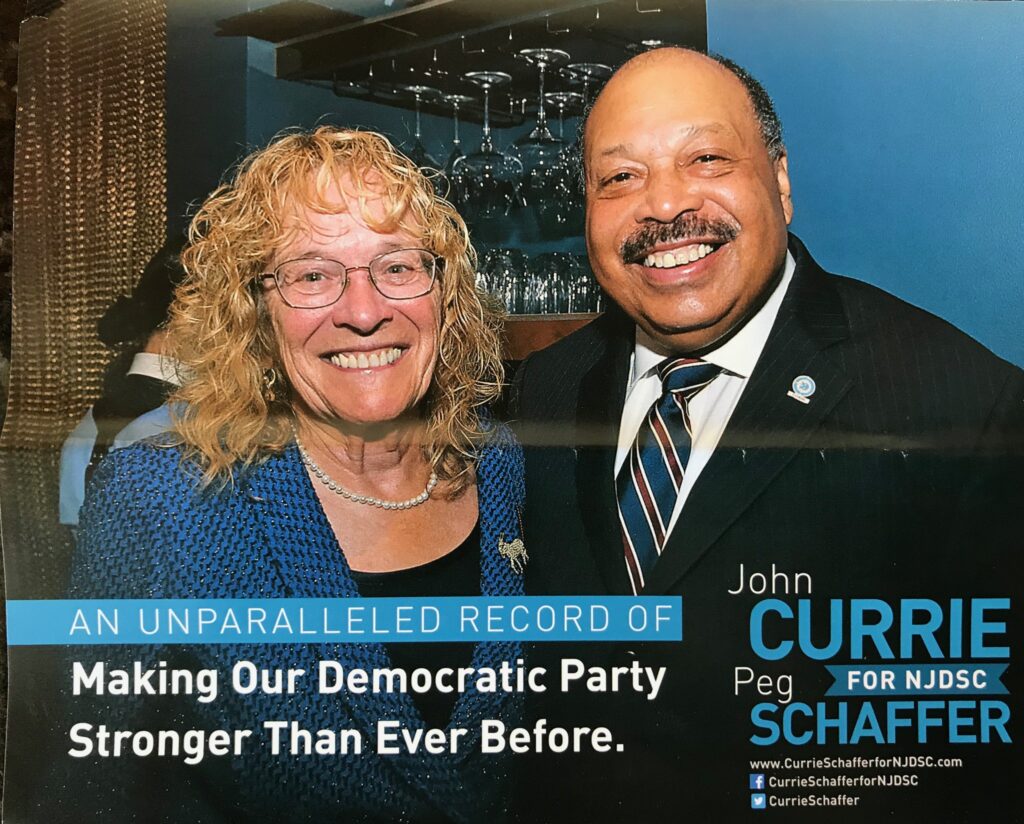Anti-Christie Enablers Versus the Purveyors of Democratic Party Unity
Listen to audio version of this article

Even for those accustomed to the tradition of New Jersey politics as blood sport, the level of bitterness, acrimony and personal animosity [bubbleAutoLink text="surrounding the selection" id="44168"] of a Democratic State Committee chairman is astounding.
Should Essex County chairman Leroy Jones succeed in ousting incumbent John Currie (in a campaign mailer, above, with running mate Peg Schaffer) from the leadership post, it would be tantamount to a vote of “no confidence” in Gov. Phil Murphy, an unprecedented public rebuke to a governor elected only two years ago with 56 percent of the vote, a governor poised to become chairman of the National Democratic Governors Association and who faces re-election in 2021.
Denying a sitting governor the freedom to select a party leader would constitute an extraordinary break from tradition, one that acknowledges the chief executive’s authority as a political as well as governmental leader. Moreover, acquiescing in the governor’s selection signifies unity, solidarity and common purpose.
The outcome of the Currie versus Jones confrontation could potentially shatter that tradition, seriously undercut the unity theme, paralyze the last two years of Murphy’s first term and tee up a destructive and divisive gubernatorial primary challenge.
It is the epitome of a power struggle for control of the party and is the inevitable consequence of a conflict that began almost at the outset of the Administration. It is not a palace coup; rather it is scorched earth combat between the forces aligned with South Jersey political figure George Norcross and the party’s entrenched establishment that has been fending off Norcross’ efforts to extend his influence beyond his regional base.
[caption id="attachment_40076" align="alignnone" width="4608"] Chairman Jones, left.[/caption]
Chairman Jones, left.[/caption]
[caption id="attachment_71026" align="alignleft" width="249"] Jones running mate, former Lakewood Mayor Marta Harrison.[/caption]
Jones running mate, former Lakewood Mayor Marta Harrison.[/caption]
There’s been no effort by either side to moderate the antagonism and contempt each feels for the other. The rhetoric has been unusually harsh and brutally personal.
Murphy and Currie have accused those who’ve mounted the challenge against them as enablers of former Gov. Chris Christie whose two terms were marked by accommodations with Senate President Steve Sweeney (D-Gloucester) and Norcross, the Senator’s long-time friend, confidant and political patron.
While he stopped just short of characterizing the forces arrayed against him as Norcross puppets, Currie clearly implied that turning over control of the state party to Jones would award enormous statewide influence to the Sweeney/Norcross wing, a prize long sought by the South Jersey powerbroker.
Currie has described the campaign against him as a hostile takeover, a plot hatched by individuals who seek power to advance their own personal and private interests.
By contrast, he argues, he and the governor stand four square for all that is good, fair and honest about government --- qualities they claim their opponents lack --- and a thinly veiled suggestion that a sleaze factor is part of their motivation.
They’ve attempted to buttress their arguments by using the scandal involving the awarding of [bubbleAutoLink text="tax breaks and incentives" id="55148"] by the state Economic Development Authority to personal friends and business allies of Norcross.
Norcross has denied any misconduct and charged that the governor has used the allegations to discredit him personally and destroy his political standing.
In supporting the effort to depose Currie, Sweeney has said party unity has been lost under the chairman and that bringing in new leadership is the only solution. He noted that he supported Currie for the chairman’s post five years ago but has since concluded that it is time for a change.
Jones, according to a number of insiders and observers, has commitments in hand from 55 committee members, more than sufficient for his election.
Jones received a major and perhaps decisive boost when Ocean County Democratic Chairman Wyatt Earp threw his support to him, startling and angering the Currie forces who felt Earp had pledged himself to the chairman. (As an aside, is there a more apt name for a political leader than Wyatt Earp?)
Jones seems to be in a solid position, his support holding firm and leading some party leaders to offer overtures to Currie to abandon the contest to avoid leaving blood on the floor and a party at war with itself.
Currie has shown no indication that he’ll back down and has rejected cutting a deal to implement some sort of power-sharing arrangement with Jones. He and Murphy continue to predict victory despite the odds seemingly stacked against them.
The most immediate issue at stake is the chairman’s appointment of members of the legislative reapportionment commission, the panel responsible for drawing new district boundaries in force for the 2021 Senate and Assembly elections.
While the commission and its responsibilities are inside baseball in terms of the general public, the stakes are high for the governor and Currie who will select commissioners to represent their interests.
If the appointment power lies with Jones, the fear on the part of the Administration is that his selections will further expand the Norcross influence in crucial determinations over which legislators will run in which districts.
Beyond that, awaits the gubernatorial election and the potential for a primary challenge to Murphy who, should he stand for re-election, could do so heading a party whose chairman he neither wanted nor selected.
There is understandable angst in the party over the chairman’s contest and the failure up to this point to come up with a peace plan.
Jones, it appears, is confident that the commitments he’s received will remain unmoved while Currie appears to be banking on loyalty to party and an incumbent governor to carry the day for him.
No matter the outcome, the bitterness will linger for some time, the rhetorical vitriol not soon forgotten. Long memories are an integral component of political thought and action and none is longer --- according to legend, at least --- than that of George Norcross.
It will certainly take its place in New Jersey’s political lore, recalled by participants and observers alike and re-told --- embellished, perhaps --- as an object lesson in the fate of individuals engaged in the state’s favorite blood sport.
Carl Golden is a senior contributing analyst with the William J. Hughes Center for Public Policy at Stockton University.





